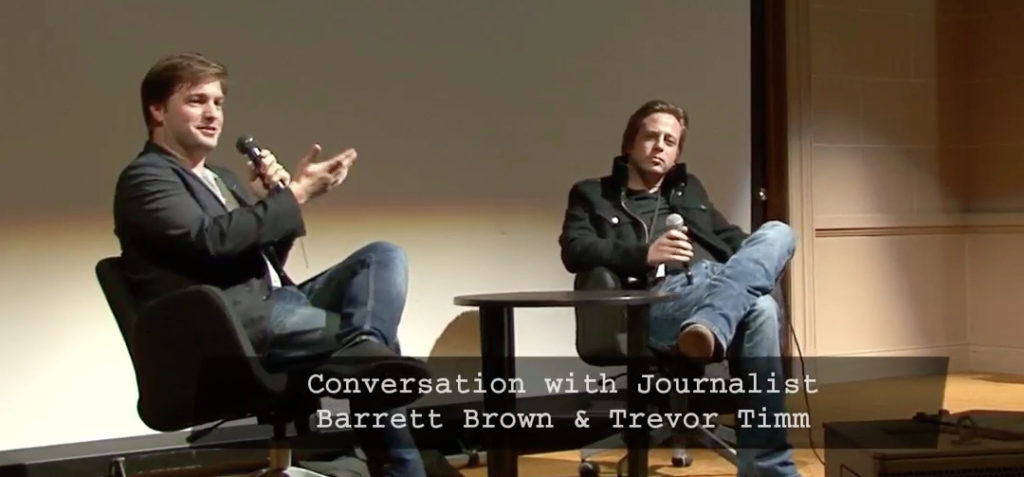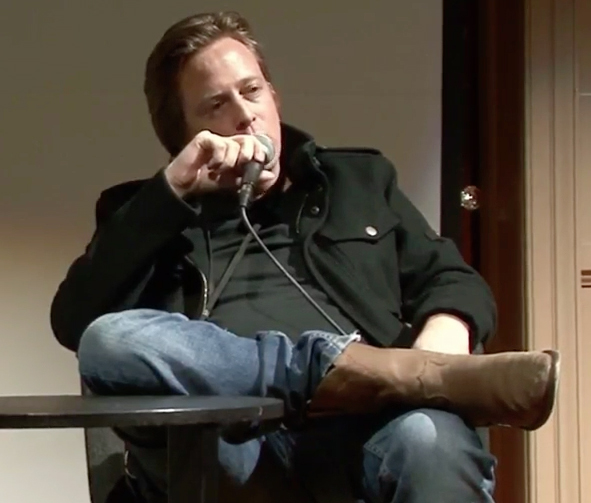Link to YouTube video — Internet Archive Video — Audio (.wav)

Partial transcription:
Trevor Timm: Could you tell us a little bit about what the theme is of your memoir…What are you trying to get across to readers?
Barrett Brown: There are a couple sort of overlapping issues. One is that, these institutions that we’ve inherited. We should not be surprised when they fail. They weren’t invented by philosopher kings with unlimited resources and the ability to implement their vision. They grew up haphazardly by very imperfect people and are frequented and designed and maintained by certain subsets of people that sometimes are outright psychotic. And other times, when they are noble, have their hands tied.
So, we have these institutions crumbling and proving themselves to be less solid than we once assumed them to be. That’s important.
The other important aspect of our age is that we can no longer look back on the 80s and 90s or 60s or anytime prior to determine what’s possible. To determine what’s viable or probable. The framework, the environment in which human collaboration occurs has changed so fundamentally and drastically in a historically short period of time that we cannot base our course of action, or the experiments we undertake, or the things we do on what others were able to pull off. We just can’t. What we can do, is always keep in mind that all human collaboration; Human collaboration is where all this comes from. All of our states. All of our laws. All of our problems. And so when the means change, and the possibilities suddenly increase in ways that we can’t understand yet, we have to explore all of these options. And I think it’s viable to really be able to do that in an effective way in the next decade or so, with Pursuance and all of these other things that are coming out.
Trevor Timm: Absolutely. (pause) With this being Aaron Swartz Day, I’d love to hear from you; Did you actually know Aaron personally? If you did or if you didn’t: How do you think about his legacy?
Barrett Brown: I didn’t really know him. I think I encountered him once or twice online.
He (Aaron) once offered to do an FOIA request on persona management. One of my interests back then. One of these disinformation propaganda methodologies that have come out of the intelligence contract industries, and had been encouraged by various states. Something that I think is very dangerous. So he offered to do his thing on that. To explore the possibilities and see if we could get some information on it. And the interesting thing about that is that I’d sort of forgotten about it until very recently. I’m not sure where that was left. I’m not sure if he got some results back. Someone asked me about it.
But it showed Aaron Swartz knew what was important. He agreed with me on this one aspect of these propaganda methodologies being important, and he also anticipated all of us in envisioning a different kind of internet that we didn’t accept from last year, that we’d actually build from the ground up according to our values…
(Yes, the sound mysteriously goes out for 15 seconds at the end, but probably it was just operator error as there were many errors throughout the broadcast – many apologies and I PROMISE we’ll have a professional webcaster next year :,-(
